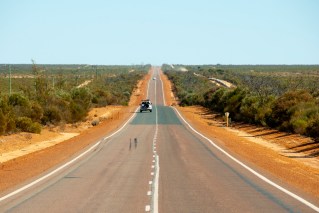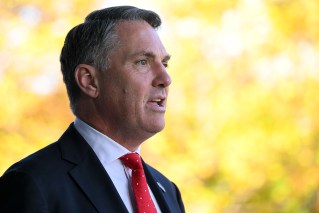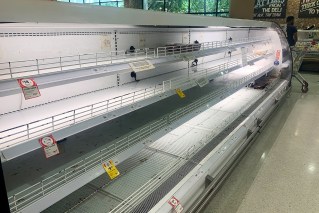Fifty one stranded whales dead on remote WA beach
Incredible aerial images show a pod of “stressed” whales gathering off Western Australia’s coast before they tragically beached themselves.
The long-finned pilot whales came together in a heart formation, with experts saying they appeared to be “affected” and “infected” by each other.
The “very unusual” build-up of whales resulted in 51 dying after they became stranded on a beach, east of Albany.
Even though the mammals could have escaped, they remained together and many tragically perished.
Wildlife experts were desperately trying to save the remaining 46 on Wednesday.
The rare images captured before a mass stranding were supplied by WA’s Department of Environment.

A pod of long-finned pilot whales gather in a heart formation near Cheynes Beach, WA. Photo: AAP
The large pod was spotted huddling together and swimming perilously close to Cheynes Beach, 60 kilometres from Albany, on Tuesday morning.
As the day progressed, the pod began moving closer to the beach, sparking the concern of Department of Biodiversity, Conservation and Attractions officers.
Moments before the stranding, crews were surprised to see the pod form a loose heart shape in the ocean, which was captured by a drone camera.
By 4pm a large stretch of the shoreline was covered in floundering mammals.
DBCA Parks and Wildlife Service staff, including Perth Zoo veterinarians and marine fauna experts, on Wednesday began grouping stranded whales before refloating them together to give them a better chance of survival.
Officials initially estimated the number of whales involved at 70 before the tally was lifted on Wednesday to 97.
Crews have been inundated by hundreds of offers to help, with Parks and Wildlife staff asking the public to stay away.
There are multiple hazards in the area, including large, distressed and potentially sick whales, sharks, waves, heavy machinery and vessels.
Wildlife experts have speculated the unusual behaviour of the whales could be an indicator of stress or illness within the pod.
Source: WA DBCA
Macquarie University wildlife scientist Vanessa Pirotta said the reason for whales stranding themselves remained a mystery.
“The fact they were in one area very huddled and doing really interesting behaviours and looking around at times suggests something else is going on that we just don’t know,” she said.
What set Cheynes Beach’s event apart from previous strandings was the availability of footage showing the animals before it, she said.
Analysing the clip, Dr Pirotta said a whale might have been sick or the pod might have become disorientated but it was unlikely they were trying to avoid predators.

The whales gather closely before stranding themselves. Photo: AAP (Department of Environment)
Griffith University whale researcher Dr Olaf Meynecke said of all whales, dolphins and porpoises, pilot whales were most prone to mass strandings.
The whales were highly social animals and maintained complex familial relationships with their pods from birth.
Dr Meynecke described a kind of ripple effect that could occur when some individuals got stressed.
“The stress seems to build up. They are so closely bonded it’s almost like they are stressing each other out and they are so bound together they will just go in as a bubble.
“It kind of makes sense given their strong emotional bonding to their peers.”
Dr Pirotta saids the whales had a “follow-the-leader type mentality” that could be the reason behind mass strandings.
-AAP








